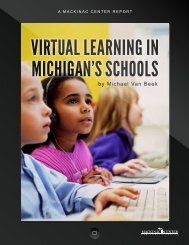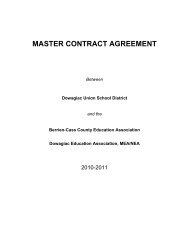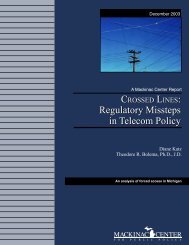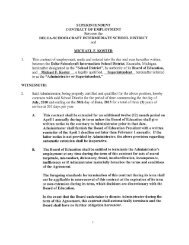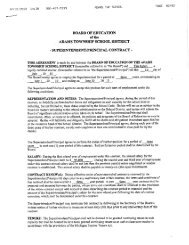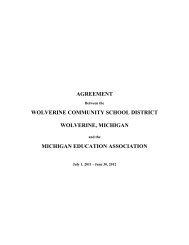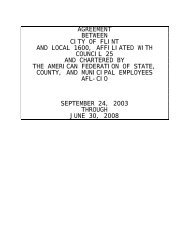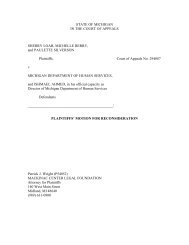The Cost of Remedial Education - Mackinac Center
The Cost of Remedial Education - Mackinac Center
The Cost of Remedial Education - Mackinac Center
You also want an ePaper? Increase the reach of your titles
YUMPU automatically turns print PDFs into web optimized ePapers that Google loves.
<strong>The</strong> <strong>Cost</strong> <strong>of</strong> <strong>Remedial</strong> <strong>Education</strong>:<br />
How Much Michigan Pays When Students Fail to Learn Basic Skills<br />
<strong>Mackinac</strong> <strong>Center</strong> for Public Policy<br />
Appendix III: Additional <strong>Cost</strong>s, Causes, and Policy<br />
Implications <strong>of</strong> <strong>Remedial</strong> <strong>Education</strong><br />
by Herbert J. Walberg, Ph.D.<br />
Dr. Jay P. Greene has modestly and cautiously reported exemplary research on the<br />
costs <strong>of</strong> deficient basic skills in Michigan. He makes defensible assumptions and, as he<br />
points out, provides conservative estimates. His best estimates <strong>of</strong> the current annual costs <strong>of</strong><br />
basic skills deficiencies are $601 million in Michigan and $16.6 billion in the United States.<br />
Greene points out some costs left out <strong>of</strong> his calculations. But there also are some<br />
costs he not only left out, but also didn’t mention. 54 For example, wasted years in school<br />
means potential earnings lost. Is this loss comparable to what might have been earned fulltime<br />
at unskilled work in factories, on farms, or in service industries? We should, moreover,<br />
consider the costs <strong>of</strong> lost human capital and other forms <strong>of</strong> capital. 55 Such costs are no less<br />
important than immediately foregone earnings, even if their size cannot be easily calculated.<br />
Efficient schooling, for example, would yield not merely basic skills mastery but even<br />
advanced skills. Most parents, citizens, educators, and policy-makers rightly assume that<br />
such pr<strong>of</strong>iciency and advanced skills not only repay the individuals who acquire them but the<br />
society that invests in them. 56<br />
Higher cognitive skills result in increased productivity, which contributes to greater<br />
economic growth. This advantage applies not merely in the first year on the job or in college<br />
but to three-quarters <strong>of</strong> a lifetime or so beyond high school. Long-range economic growth, in<br />
turn, can provide a better quality <strong>of</strong> life.<br />
An analysis <strong>of</strong><br />
students in<br />
economically<br />
advanced countries<br />
showed that U.S.<br />
students made the<br />
least gains in<br />
reading,<br />
mathematics, and<br />
science during the<br />
school years<br />
studied.<br />
As a psychologist specializing in educational productivity, my preference is to<br />
emphasize the lack <strong>of</strong> school standards and the resulting poor academic performance <strong>of</strong> our<br />
students despite unprecedented outlays <strong>of</strong> money and resources. My recent analysis <strong>of</strong><br />
reports from the Organization for Economic Cooperation and Development shows that,<br />
among students in economically advanced countries, U.S. students made the least gains in<br />
reading, mathematics, and science during the school years studied. Yet, our per-student costs<br />
were third-highest. 57<br />
54<br />
55<br />
56<br />
57<br />
<strong>The</strong>re also seem to be one or more minor inconsistencies in his estimates that would lead to<br />
unestimated or underestimated costs. Greene counts, for example, the tuition and other costs <strong>of</strong><br />
community colleges but only the tuition costs <strong>of</strong> four-year public institutions, even though they are<br />
publicly subsidized.<br />
See, for example, Gary A. Becker, A Treatise on the Family (Cambridge, MA: Harvard University<br />
Press, 1981) and James S. Coleman, Foundations <strong>of</strong> Social <strong>The</strong>ory (Cambridge, MA: Harvard<br />
University Press, 1990).<br />
Some economists distinguish these by the terms “private” and “social” returns <strong>of</strong> education.<br />
Herbert J. Walberg. Spending More While Learning Less (Washington, DC.: Thomas B. Fordham<br />
Foundation, 1998).<br />
September 2000 33



